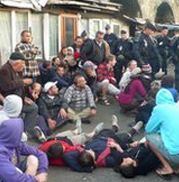 Not only does this make it difficult to eradicate disease, it could even skew disease surveillance figures if large numbers of unvaccinated people are not even on the public health system’s radar.
Not only does this make it difficult to eradicate disease, it could even skew disease surveillance figures if large numbers of unvaccinated people are not even on the public health system’s radar.
Dr Andreas Schultz of Médecins du Monde (MDM) told a workshop in the European Parliament that undocumented migrants, asylum seekers, homeless people and nomadic populations are falling through cracks in the public health system – even when they are keen to be vaccinated.
Official EU figures show that around 85% of measles cases in Europe are recorded among people who had not received the MMR vaccine. “The MMR vaccine is safe, effective and provides lifelong protection for most people, but 95% coverage with two doses is needed to eradicate the disease,” Dr Schultz told a meeting attended by MEPs and stakeholders.
He said changes to social welfare and migration policies could help Europe reverse the increase in measles cases seen since 2008.
For example, German social welfare centres are obliged to report undocumented patients so, while vaccination is said to be free and accessible, most migrants steer clear of immunisation clinics for fear of being reported.
Similarly, unregistered migrants in Belgium are legally entitled to access healthcare but face administrative barriers, according to Dr Schultz, who added that only 13% of children from the Roma community living in Brussels have a vaccination booklet.
He said a police crackdown on Roma camps in France caused a public health risk by encouraging the community to disperse, breaking fragile ties with on-site public health services.
According to Dr Schultz, separate research projects in Bulgaria and Belgium found strong support for vaccination in the
Impact of financial crisis
Financial barriers are a growing challenge in several European countries, he said, particularly in Greece where some of the burden of paying for vaccines is shifting from public and private health insurers to families. Over the past six months, MdM vaccinated more than 1,000 children whose families wanted vaccines but could not afford them.
Dr Schultz recommended full access to vaccination for all and called on policymakers to evaluate the long-term impact of austerity measures on health systems. He said cutting back on immunisation programmes was short-sighted and led not just to increased disease but also to lost productivity for parents and missed school days for children.
Also speaking at the workshop, Dr Piotr Kramarz, Deputy Chief Scientist at the European Centre for Disease Prevention and Control (ECDC) said vaccines should not be seen as cost-generating but as an investment.
He said some EU member states are close to eliminating diseases such as measles and rubella but “diseases know no borders” so greater efforts are needed right across the continent.
In addition, Dr Kramarz noted that the EU is undermining measles elimination efforts outside the EU. “The Americas eliminated measles in 2002 so their outbreaks are mostly caused by people infected with measles traveling from Europe and elsewhere,” he said.
Dr Ronald de Groot, President of the European Society of Paediatric Infectious Diseases, said catch-up MMR vaccination programmes will be needed to contain the spread of measles within Europe and stop exporting the disease around the world.
He also called for greater “consistency” between national vaccination schedules in Europe which currently vary significantly from country to country.




